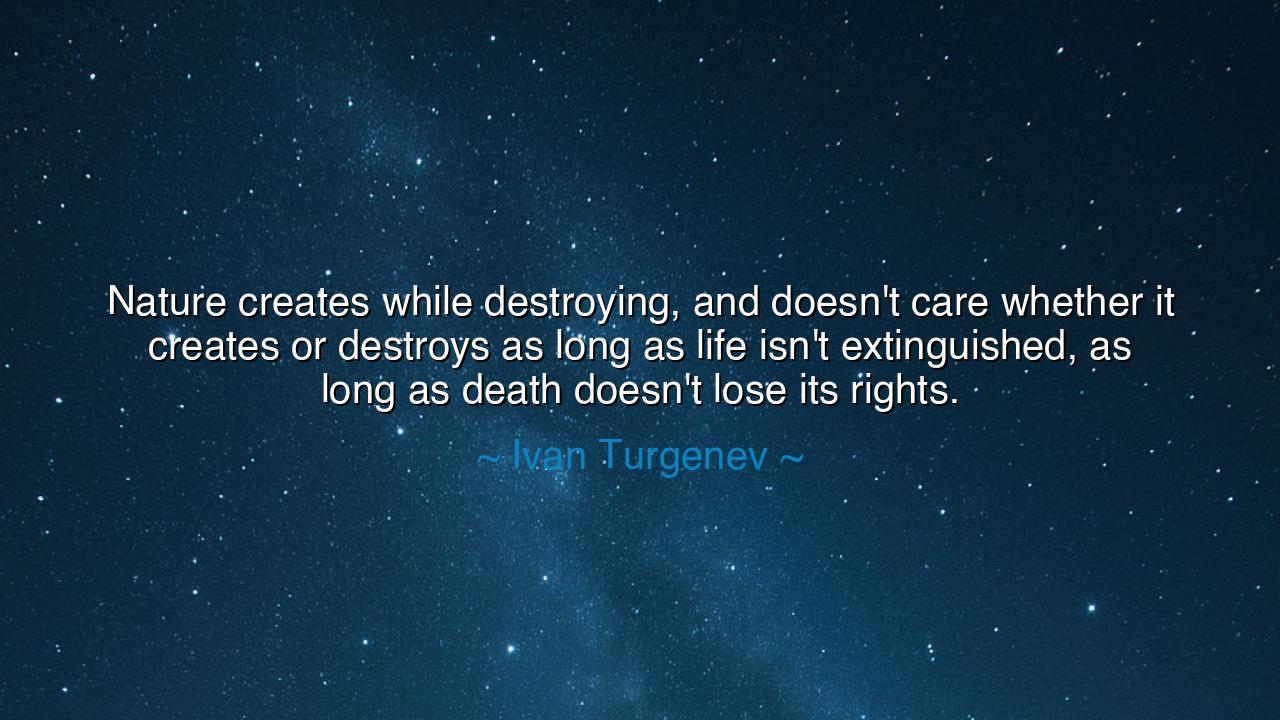
Nature creates while destroying, and doesn't care whether it
Nature creates while destroying, and doesn't care whether it creates or destroys as long as life isn't extinguished, as long as death doesn't lose its rights.






When Ivan Turgenev wrote, “Nature creates while destroying, and doesn’t care whether it creates or destroys as long as life isn’t extinguished, as long as death doesn’t lose its rights,” he was peering into the heart of existence itself — that great, ceaseless dance between birth and decay, between becoming and ending. His words speak not with cold detachment, but with the somber reverence of one who has looked upon both beauty and ruin and seen them as one. In this truth lies the eternal paradox of Nature: that her destruction is never without creation, and her creation is never without destruction. The seed must split for the flower to bloom, the storm must rage for the earth to renew, and death itself must walk hand in hand with life so that the cycle may endure.
Turgenev, a man of both intellect and feeling, lived in a century of upheaval — of revolution, discovery, and doubt. In Russia, he saw the land both suffer and flourish, its people torn between old faith and modern thought. His novels and reflections often explored the vastness of the natural order, the indifference of the universe to human struggle. When he wrote these words, he was giving voice to a profound and ancient wisdom: that Nature — the mother of all — has no pity and no malice, only purpose. She does not act with cruelty, nor with mercy; she simply is. And in her silent balance of creation and destruction, there is an unyielding justice that no man can alter.
The meaning of his words unfolds like the changing of seasons. Creation and destruction are not opposites, but partners. One gives way to the other, endlessly. The forest burns, and in the ashes lie the seeds of renewal. The animal dies, and its body nourishes the soil for new life. Even the stars themselves — those eternal fires of the heavens — must one day collapse, scattering the dust from which new suns are born. Turgenev teaches us that it is not death we should fear, but stagnation, the halting of life’s eternal motion. For if death were to lose its rights, life itself would wither. It is the shadow that gives shape to the light, the ending that gives meaning to the beginning.
In this truth, the ancients themselves found their faith. The Hindus saw it in Shiva, the great god of both creation and destruction, whose dance keeps the cosmos alive. The Greeks saw it in Gaia and the turning of the seasons — the harvest and the fall, the frost and the thaw. The Romans, too, built their wisdom upon this understanding, carving upon their temples the words “Tempus Edax Rerum” — “Time devours all things.” Yet they knew that from the devouring came rebirth. Even in the fall of their empire, the seeds of a new world were sown. Thus, across all ages, the wise have bowed before the law of Nature’s duality, knowing that destruction is but another name for change.
We see this truth written again and again in the stories of our kind. When the ancient city of Pompeii was buried beneath the ash of Vesuvius, it seemed that all life had been extinguished. Yet from that death, centuries later, rose a window into history — a preserved testament to the lives, art, and beauty of a lost civilization. Likewise, after the devastation of war, nations have rebuilt themselves stronger, tempered by suffering into resilience. Life, even amid ruin, finds a way to continue — for Nature’s hand, though it strikes down, also lifts up. Destruction is never the end; it is the beginning of transformation.
In Turgenev’s vision, even the cold indifference of Nature carries a lesson for the human heart. For though she “doesn’t care,” we are not called to imitate her indifference, but to understand it. Nature’s lack of pity teaches us not cruelty, but acceptance — to see that suffering and loss are part of the sacred order, that we too are threads in this vast tapestry. To rage against change is to fight the current of a river that has flowed since the dawn of time. But to move with it — to see both death and life as holy — is to find peace in the face of all that passes.
So take this lesson, child of dust and breath: do not despair when life breaks what you have built. Do not curse the fire that burns, nor the wind that scatters. For what is lost will rise again in another form. Let your heart learn from the trees, which do not mourn their fallen leaves but trust in the promise of spring. Let your soul be like the earth — enduring, forgiving, fertile even after ruin. For as Ivan Turgenev taught, Nature creates while destroying, and though she cares not for our small desires, her law is eternal and her purpose pure: that life, through every ending, may never cease to be.






AAdministratorAdministrator
Welcome, honored guests. Please leave a comment, we will respond soon